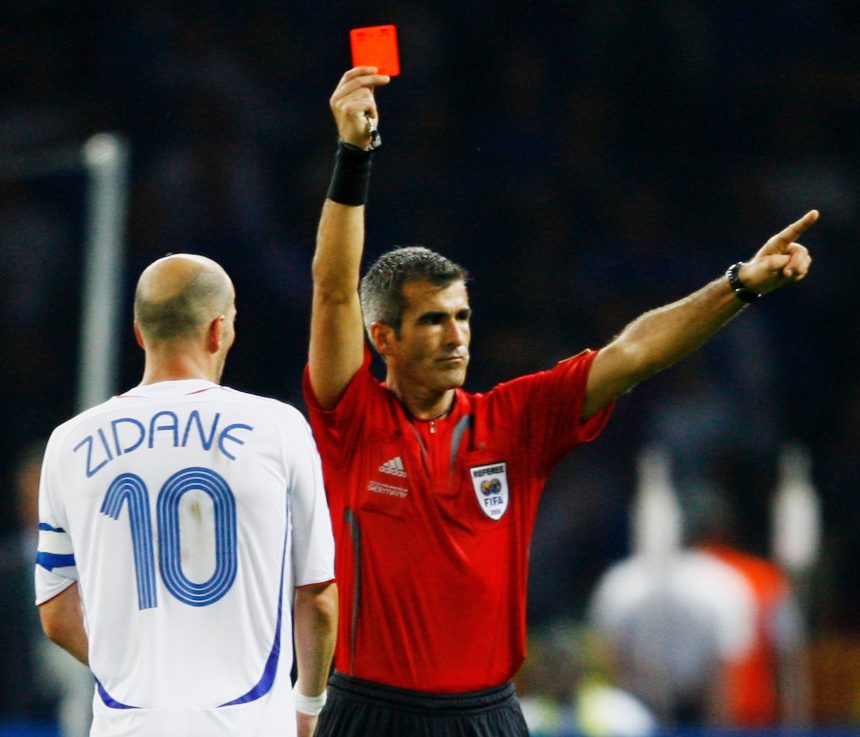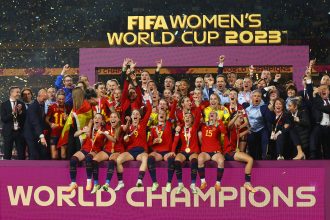66. Expulsion and match suspension
1. A player who has been sent off:
a) shall stay in the team dressing room or the doping control room, accompanied by a chaperone, until the names of the players selected for the doping test are communicated. The player may be allowed to sit in the stands, provided their integrity and security are safeguarded, they are not picked for doping control, and are no longer wearing their football equipment;
b) is not entitled to attend the post-match press conference or any other media activity held in the stadium.
2. A player who is serving a match suspension:
a) may be allowed to sit in the stands, but not in the immediate vicinity of the field of play, provided their security and integrity are safeguarded;
b) shall not enter the dressing room, tunnel, or technical area, before or during the match, attend the warm-up, or sit on the team bench. After the final whistle, a suspended player may join their team in the dressing room;
c) is not entitled to attend the post-match press conference or any other media activity held in the stadium.
3. An official who has been sent off or is serving a match suspension:
a) may be allowed to sit in the stands, but not in the immediate vicinity of the field of play, provided their security and integrity are safeguarded;
b) shall not enter the dressing room, tunnel, or technical area, or communicate with or contact any person involved in the match – in particular, players or technical staff – by any means whatsoever prior to or during the match;
c) is not entitled to attend the post-match press conference or any other media activity held in the stadium.
4. A sending-off automatically incurs suspension from the subsequent match. The FIFA judicial bodies may impose additional match suspensions and other disciplinary measures.
5. The automatic match suspension and any additional match suspension must be served, even if the sending-off is imposed in a match that is later abandoned, annulled, forfeited, and/or replayed.
6. If a match is abandoned, canceled, or forfeited (except for a violation of article 19), a suspension is only considered to have been served if the team to which the suspended player belongs is not responsible for the circumstances that led to the abandonment, cancellation, or forfeit of the match.
7. A match suspension is regarded as no longer pending if a match is retroactively forfeited because a player took part in a match despite being ineligible. This also applies to the match suspension imposed on the player who took part in the match despite being ineligible.
67. Carrying over cautions
1. If a person receives a caution in two separate matches of the same FIFA competition, they are automatically suspended from the next match in that competition. Such suspensions must be served before any other suspension. The Disciplinary Committee may exceptionally depart from or amend this rule before the start of a particular competition. Any such decision reached by the Disciplinary Committee is final and binding.
2. Cautions received during one competition are not carried over to another competition.
3. They are, however, carried over from one round to the next in the same competition. The Disciplinary Committee may exceptionally depart from this rule before the start of a particular competition. This provision is subject to article 68 of this Code and to any derogating rules that FIFA may issue for a specific competition.
4. If a person is sent off as a result of a direct red card, any other caution they have previously received in the same match is upheld.
68. Cancellation of cautions
1. The Disciplinary Committee may, at its own discretion and on its own initiative or at the request of a confederation, cancel cautions that have not resulted in a sending-off or a suspension by means of a decision not subject to appeal.
2. In any case, the committee may do this only once in any competition.
69. Carrying over match suspensions
1. As a general rule, every match suspension (of players and other persons) is carried over from one round to the next in the same competition.
2. Match suspensions imposed in terms of matches in relation to a sending-off issued against a player outside of a competition (separate match[es]) or not served during the competition for which they were intended (elimination or the last match in the competition) are carried over as follows:
a) FIFA World Cup™ and FIFA Women’s World Cup™: carried over to the representative team’s next official match;
b) competitions subject to an age limit: carried over to the representative team’s next official match in the same age group. Where the suspension cannot be served in the same age group, it shall be carried over to the next highest age category;
c) FIFA Club World Cup: carried over to the club’s next official match;
d) Women’s Olympic Football Tournament: carried over to the representative team’s next official match;
e) Men’s Olympic Football Tournament: for players who meet the age limit, carried over to the representative team’s next official match in the same age group. Where the suspension cannot be served in the same age group, it shall be carried over to the next-highest age category. For players who do not meet the age limit, it shall be carried over to the representative team’s next official match;
f) confederation competitions for representative teams: carried over to the representative team’s next official match;
g) competitions in which teams have been chosen in accordance with certain criteria (cultural, geographical, historical, etc.): unless the regulations of these competitions specifically stipulate otherwise, the suspension is carried over to the representative team’s next official match;
h) friendly matches: carried over to the representative team’s next friendly match.
3. If a representative team is hosting a final competition and is consequently not required to participate in qualifying matches to reach the final competition of this tournament and its next official match is in that final competition, any match suspension shall be carried over to the representative team’s next friendly match.
4. In no case may match suspensions resulting from several cautions issued to a player in different matches of the same competition be carried over to another competition.
5. Officials of a club or an association shall serve a match suspension with any club or association of which the official is an official.
6. Match suspensions that have to be carried over to another competition must be served by the person concerned, regardless of whether the status of that person has changed in the meantime, including from player to official or vice versa.
70. Extending sanctions to have a worldwide effect
1. If the infringement is serious, in particular, but not limited to discrimination, manipulation of football matches and competitions, misconduct against match officials, or forgery and falsification, as well as sexual abuse or harassment, the associations, confederations, and other organizing sports bodies shall request that the Disciplinary Committee extend the sanctions they have imposed so as to have the worldwide effect (worldwide extension).
2. Any doping-related legally binding sanction imposed by another national or international sports association, national anti-doping organization, or any other state body that complies with fundamental legal principles shall automatically be adopted by FIFA and, provided that the requirements described hereunder and in article 74 of the FIFA Anti-Doping Regulations are met, shall be automatically recognized by all confederations and associations.
3. The request shall be submitted in writing via the FIFA Legal Portal and enclose a true copy of the decision. It shall include the name and address of the person who has been sanctioned and that of the club and the association concerned as well as evidence that the person concerned has been informed that the sanction will be submitted for a worldwide extension.
4. If the Disciplinary Committee discovers that associations, confederations, and other sports organizations have not requested a decision to be extended to have the worldwide effect, a decision may still be passed ex officio.
5. A worldwide extension will be approved if:
a) the person sanctioned has been cited properly;
b) they have had the opportunity to state their case (with the exception of provisional measures)
c) the decision has been communicated properly;
d) the decision is compatible with the regulations of FIFA;
e) extending the sanction does not conflict with public order or with accepted standards of behavior.
6. The chairperson of the Disciplinary Committee takes their decision, in principle, without deliberations or orally hearing any of the parties, using only the file.
7. The chairperson may exceptionally decide to summon the parties concerned.
8. The chairperson is restricted to ascertaining that the conditions of this article have been fulfilled. They may not review the substance of the decision.
9. The chairperson shall either grant or refuse to grant the request to have the sanction extended.
10. A sanction imposed by an association or a confederation has the same effect in each association of FIFA, in each confederation, and in FIFA itself as if the sanction had been imposed by any one of them.
11. If a decision that is not yet final in a legal sense is extended to have the worldwide effect, any decision regarding extension shall follow the outcome of the association’s or confederation’s current decision.
71. Review
1. A review may be requested before the competent judicial body after a legally binding decision has been passed if a party discovers facts or proof that would have resulted in a more favorable decision and that, even with due diligence, could not have been produced sooner.
2. A request for review shall be made within ten days of discovering the reasons for review.
3. The limitation period for submitting a request for review is one year after the decision has become final and binding.
By: FIFA Disciplinary Code, 2023





